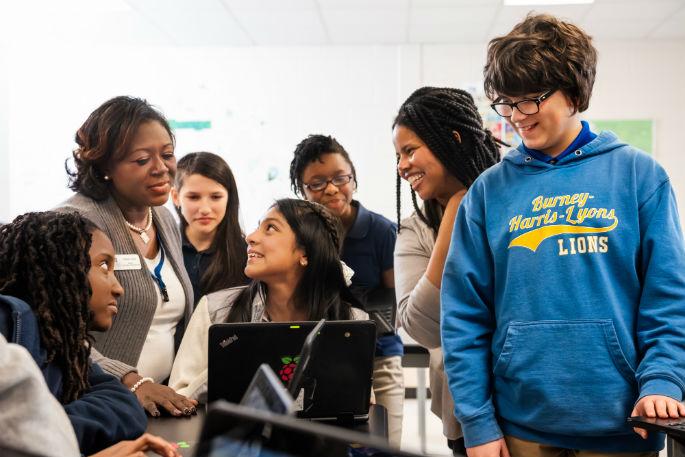Employers and Universities: Work with us?

New project aims to get more girls studying computer science
Did you know that only 20% of GCSE students taking computer science at GCSE are girls? That number drops to just 10% at A-levels. A new project from the government aims to change that, by encouraging more girls to study computing.
The Department for Education has given £2.4 million to a research project called Gender Balance in Computing. It will test out several new initiatives to boost girls’ participation in computing, which will be carefully measured to see if they work.
Read more: Here's where computer science can take you
More than 15,000 students and 550 schools across England will be involved in the trials, which will run from this year until 2022. It’s the largest research project of its kind.
‘Gender Balance in Computing’ is a collaboration between the consortium of the Raspberry Pi Foundation, STEM Learning, BCS, The Chartered Institute for IT, and the Behavioural Insights Team. Apps for Good and WISE will also be working on the project.
Sue Sentance, Chief Learning Officer at the Raspberry Pi Foundation, said: “The challenge of encouraging more girls to take up the subject has long been a concern, and overcoming it will be critical to ensuring that the nation’s workforce is suitably skilled to work in an increasingly digital world. I'm very proud to be working with a range of excellent organisations on this important research project on such a scale, and together, we have the opportunity to rigorously trial a range of evidence-informed initiatives to improve the gender balance in computing in primary and secondary schools.”
Read more: 5 inspirational women shaking up the tech scene
Helen Wollaston, Chief Executive of WISE, said: “Technology is transforming every aspect of our lives, and we will need more people with an excellent mix of technical and interpersonal skills. With so many new opportunities and career paths, it is essential that we engage more girls in computer science at GCSE and A level so that they can fulfil their potential. WISE is excited to be working on this project, bringing our knowledge and experience of engaging girls in STEM to the programme and working towards evidence-based solutions that make a real difference to the number of girls choosing computing. It is vital that we show girls the skills required for opportunities in computing now, so they can make well-informed decisions about their future.”
Sophie Ball, Co-Managing Director of Apps for Good, said: “A young person's location, background, or gender should never be a barrier to their future success. Apps for Good empowers young people to change their world through technology, and we have a strong track record of engaging girls in computing. We are excited to be a part of this important work to develop, test, and scale solutions to inspire more girls to pursue technology in education. We look forward to helping to build a more diverse talent pool of future tech creators.”
Read next: Four famous women in science — and what inspired them in school
Image courtesy of Raspberry Pi
